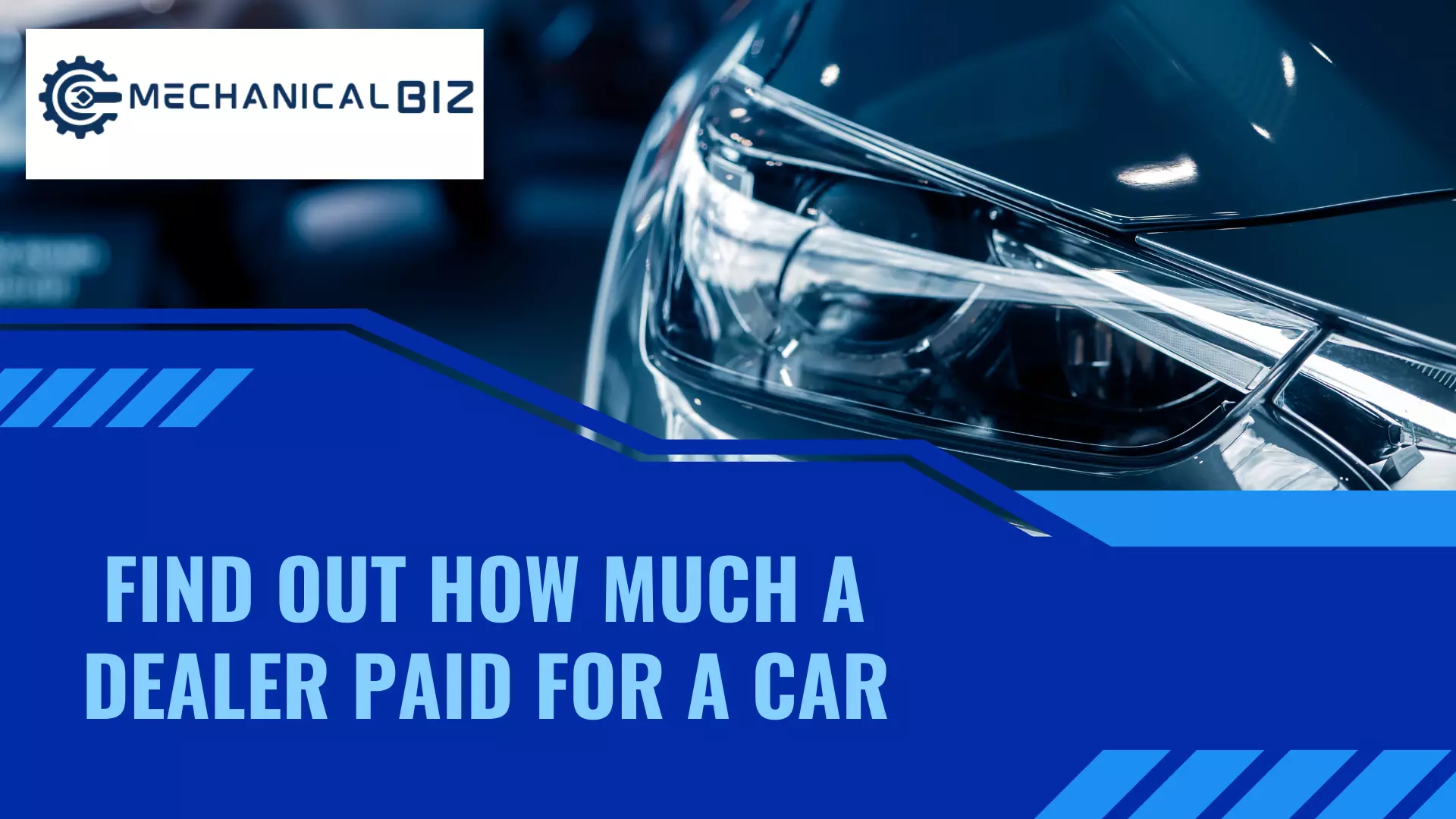To determine a dealer’s purchase price for a vehicle, request the invoice price or consult car valuation tools. Reviewing a model’s factory invoice, which reveals the dealer’s cost, can aid negotiation.
Deciphering the true cost a dealership pays for a car can be a strategic move if you’re in the market for a new vehicle. Gaining insight into the dealer’s expenses not only empowers your negotiation tactics but also provides a clearer picture of the potential room for price adjustments.
Knowing the invoice price, which represents what the dealer likely paid for the car, minus any manufacturer rebates or incentives, is crucial. It sets a starting point for discussions and helps you determine a fair offer. Insightful buyers often turn to car-buying websites and online guides that estimate dealer costs and fair purchase prices for most models. Researching and understanding these figures equips you with the knowledge to confidently navigate the car buying process and secure the best possible deal.
The Dealer Invoice Price
Uncovering the dealer invoice price of a car can feel like a clandestine affair, but with the right tools and knowledge, it’s an achievable task. Typically, the invoice price represents the cost the dealer paid to the manufacturer. Gaining access to this information equips buyers with negotiating power during the purchase process.
Interested parties should first explore online resources. Websites such as Kelley Blue Book or Edmunds often provide insights into a car’s invoice price. Alternatively, reaching out to consumer advocacy groups can prove beneficial.
Another approach involves directly asking the dealership. While some may not disclose the exact figures, many are willing to share invoice-related details to facilitate a transparent transaction. Prospective buyers can also examine factory order sheets or sales event promotions that sometimes reveal pricing clues reflective of the dealer’s cost.
Researching Beyond The Invoice
Understanding the true cost that a dealer incurs for a car involves scrutinizing more than the basic invoice price. Dealers also account for additional expenses that may not be apparent at first glance. Among these are factory holdbacks, which are portions of a car’s cost that the manufacturer refunds to the dealer after a sale. This kickback effectively lowers the dealer’s overall expense.
Another crucial element to consider is the array of incentives dealers might receive. This can include bonuses for hitting sales targets, interest rate deals on finance packages, and special discounts tied to specific models or sales events. Such factors contribute to a discrepancy between the ostensive price and what the dealer truly pays, complicating efforts to pinpoint the dealer’s bottom line.
Decoding The Price: A Step-by-step Guide
Finding out how much a dealer paid for a car is a key strategy in negotiating the best deal. Numerous online resources are available to assist in uncovering this crucial piece of information. Websites such as Edmunds, Kelley Blue Book, and Consumer Reports offer insights into the dealer invoice price, which closely estimates the actual dealer cost. While these platforms won’t always disclose the exact figure, they provide a reliable baseline for negotiations.
Another effective approach involves engaging with industry insiders. Building connections with salespeople or utilizing networking platforms can lead to valuable disclosures. Enthusiast forums and automotive industry groups could also be sources of insider information, as members often share details on transactions and dealer pricing strategies. This data, coupled with online tools, significantly strengthens your bargaining position.
Leveraging Competitive Quotes
Securing competitive quotes is a crucial step in determining what a dealer has paid for a car. Begin by CONTACTING MULTIPLE DEALERSHIPS to inquire about the same make and model. This strategy not only provides insight into the current market value but also gives you leverage in negotiations. Each dealership has its own sales goals and inventory turnover rates, factors which can influence the price they are willing to accept.
Negotiation based on dealer cost requires a tactful approach as dealerships are often reluctant to reveal their purchase price. Present your research on competitive quotes and aim for a price that’s reasonably above the dealer’s cost, ensuring an equitable deal. Make it clear that you’re well informed and considering options from various dealers, encouraging them to offer a better price to earn your business.
Exploring Dealer Incentives
Understanding the dynamics of dealer incentives can significantly benefit a savvy car buyer. Dealers often receive manufacturer to dealer rebates, which are essentially discounts provided by the car manufacturer to the dealership. These rebates can occur when dealerships purchase vehicles from the manufacturer and serve as an incentive to stock more cars.
Additionally, knowledge of sales goals and bonuses is crucial. Car dealerships may have set targets that, upon achieving, unlock further financial perks from the manufacturer. These bonuses can be influenced by a variety of factors, including quarterly sales goals, end-of-year closeouts, and the sale of specific car models that the manufacturer is pushing. These hidden incentives, though not advertised, can affect the final price paid by the dealer and, consequently, the negotiating room a buyer has on the showroom floor.
Additional Costs To Consider
Understanding the additional costs associated with purchasing a vehicle is crucial. Destination fees, often seen on the factory invoice, cover the cost of transporting the vehicle from the manufacturer to the dealership. This is a standard charge applied to all new vehicles, reflecting the necessary expense of delivering the car to its final selling point. It’s important to note that these fees are non-negotiable and uniform for all buyers of the same model within a region.
Another significant expense is the Pre-Delivery Inspection (PDI) charge. Dealers justify this fee as the cost for a series of checks to ensure everything is functioning properly before the car is handed over to the customer. This can include checking fluids, tire pressure, and electronic systems. While this inspection is essential for ensuring your new car’s quality and reliability, some dealers may inflate these charges. Comparing the PDI fees among different dealers can help ensure you’re not overpaying.
Timing Your Purchase Right
Negotiating a car purchase effectively requires understanding the best timing. Dealers typically aim to hit sales targets, making the end of the month or year ideal times to buy. During these periods, car dealers are more likely to offer discounts or incentives to clear out inventory and meet quotas. Furthermore, the arrival of new models can significantly impact pricing on the previous year’s models. As dealerships make room for the latest vehicles, shoppers can capitalize on the reduced pricing of older stock. By aligning your purchase with these strategic timings, you are positioned to negotiate a deal closer to the dealer’s actual cost.
Technology And Pricing Tools
Understanding the true cost of a vehicle can be a game-changer for any buyer. Advanced car pricing algorithms are pivotal tools for this purpose. They process vast amounts of data to provide an estimate of a dealer’s vehicle cost. By tapping into pricing histories, sales incentives, and market trends, these algorithms produce information that supports stronger negotiation stances.
Several apps and websites stand out for their proficiency in harnessing these algorithms. Sites like TrueCar, Kelley Blue Book, and Edmunds offer users access to comprehensive pricing insights. Consumers gain an advantage from features such as price checkers and cost calculators which are designed to decode the complex pricing structures employed by dealerships. These digital tools simplify the buying process by elucidating the often opaque nature of car pricing.
Role-play As An Informed Buyer
Understanding the dealer’s actual vehicle cost significantly changes the dynamics of car-buying negotiations. Proper research can yield the dealer invoice price, although this may not represent the true cost given potential manufacturer rebates and incentives. Approaching the negotiation table with this knowledge empowers you as a buyer to haggle closer to the dealer’s real bottom line rather than the sticker price, potentially saving thousands.
Arm yourself with this information, and you create leverage during the negotiation. This can lead to the dealer being more transparent with their pricing and offer you a fairer deal. Dealerships often anticipate informed buyers and might respect your due diligence by offering straightforward negotiations.
Closing The Deal With Confidence
Negotiating a vehicle purchase can bring its share of last-minute dealer add-ons. These are often pitched as essential purchases, but buyers should scrutinize such offers with a critical eye. Many add-ons simply inflate the final price without providing proportional value. A common sales tactic might include extended warranties, paint protection plans, or additional insurance that may be unnecessary. It’s crucial to stick to the pre-negotiated deal and decline extras that don’t serve your long-term interests.
To secure the best deal possible, arm yourself with the knowledge of the dealer’s invoice price and stay resolute in the face of sales pressure. Remember, every add-on presented is an opportunity for the dealer to increase their profit. A well-informed buyer is the best defense against paying more than you should. Keep the negotiations focused on the agreed-upon price and ensure any additional items are ones you truly value or need.

Credit: www.elavon.com
Frequently Asked Questions For How To Find Out How Much A Dealer Paid For A Car
Can You Haggle With Car Dealers?
Yes, haggling with car dealers is common practice. By researching the dealer’s car cost and market conditions, you can negotiate a fair price.
What Resources Reveal Dealer Car Costs?
Dealers’ car costs can be estimated using invoice prices, available through online car pricing guides, and various automotive research sites.
How Does Dealer Holdback Affect Pricing?
Dealer holdback is a manufacturer rebate to the dealer after a car sale. Knowing this can provide leverage during negotiations, potentially lowering the sale price.
Is Car Invoice Price Equal To Dealer Cost?
Not exactly. The invoice price is closer to the dealer’s cost but doesn’t account for discounts, incentives, or rebates the dealer may receive.
Conclusion
Unlocking the secret to a dealer’s car cost can empower you as a buyer. Remember, research is your ally: compare prices, scrutinize invoice pricing, and don’t shy from negotiation. With these tools, you’ll confidently approach your next car purchase, poised to secure the best deal possible.
Happy car hunting!

